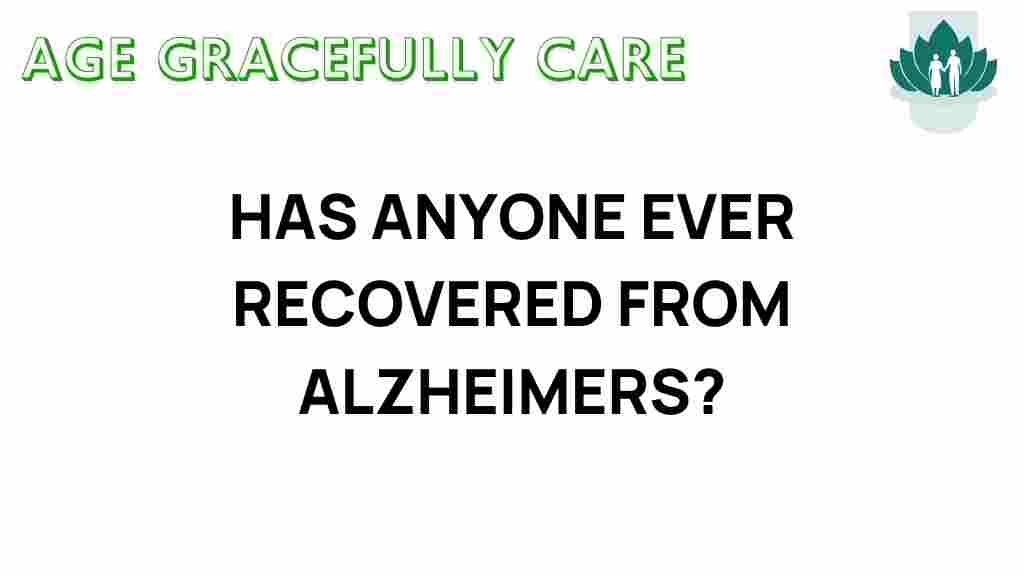Hope on the Horizon: Can Anyone Truly Recover from Alzheimer’s?
Alzheimer’s disease is a progressive neurological disorder that affects millions of individuals worldwide, leading to memory loss, cognitive decline, and ultimately, a loss of independence. With the increasing prevalence of dementia, the question of recovery and effective treatment options has become a focal point of ongoing research. This article delves into the potential for recovery from Alzheimer’s, examining current treatments, breakthroughs in research, and the hope that persists in the face of this challenging condition.
Understanding Alzheimer’s and Its Impact
Alzheimer’s disease is one of the most common forms of dementia, characterized by the gradual degeneration of brain cells. This deterioration affects cognitive health, impacting memory, reasoning, and the ability to perform everyday tasks. Understanding the nature of Alzheimer’s is crucial for recognizing the challenges faced by those diagnosed and their caregivers.
Current Treatments for Alzheimer’s
As of now, there is no cure for Alzheimer’s, but there are treatments aimed at managing symptoms and improving the quality of life for patients. Current treatment options include:
- Medications: Certain drugs can help manage symptoms related to memory and cognition. Cholinesterase inhibitors (like Donepezil) and Memantine are commonly prescribed to enhance neurotransmitter activity.
- Therapeutic interventions: Cognitive behavioral therapy and memory training exercises can assist in maintaining cognitive health.
- Lifestyle modifications: Diet, exercise, and social engagement play essential roles in managing Alzheimer’s. A balanced diet rich in antioxidants and omega-3 fatty acids can support brain health.
The effectiveness of these treatments varies, and patients often respond differently based on the stage of the disease and individual health factors. Ongoing monitoring and adjustments to treatment plans are vital for optimizing care.
Research and Breakthroughs in Alzheimer’s Treatment
Research into Alzheimer’s disease is advancing at a rapid pace, with promising breakthroughs offering hope for future treatments and potential recovery pathways. Some of the key areas of research include:
- Biomarkers: Scientists are working on identifying biomarkers that can indicate the onset of Alzheimer’s before symptoms appear. Early detection could lead to more effective interventions.
- Gene therapy: Studies are exploring the use of gene therapy to target the genetic factors associated with Alzheimer’s, potentially halting or reversing its progression.
- Immunotherapy: New treatments aimed at boosting the immune system’s ability to fight off the plaques and tangles associated with Alzheimer’s are being tested in clinical trials.
These breakthroughs are paving the way for innovative treatments that could significantly alter the landscape of Alzheimer’s care and recovery.
Steps Toward Recovery and Management of Alzheimer’s
While complete recovery from Alzheimer’s may not be feasible at present, there are steps that individuals and caregivers can take to manage the disease effectively and maintain cognitive health.
Step 1: Early Diagnosis and Intervention
Early diagnosis of Alzheimer’s is crucial for implementing effective treatment strategies. If you notice symptoms such as memory loss or difficulty completing familiar tasks, consult a healthcare professional for assessment.
Step 2: Personalized Care Plans
Each individual with Alzheimer’s is unique, and care plans should be tailored to their specific needs. Collaborating with healthcare providers, families, and caregivers can help create a comprehensive approach to managing symptoms.
Step 3: Engage in Cognitive Activities
Regularly engaging in cognitive activities can help stimulate the brain. Consider the following:
- Puzzles and brain games
- Reading and discussing books
- Learning new skills or hobbies
Step 4: Foster Social Connections
Social engagement is vital for emotional well-being. Encourage participation in community activities, support groups, or family gatherings to maintain social interactions.
Step 5: Maintain Physical Health
Physical health has a direct impact on cognitive function. Regular exercise, a balanced diet, and adequate sleep are essential components of overall health. Consider incorporating:
- Regular physical activity (walking, swimming, yoga)
- A diet rich in fruits, vegetables, whole grains, and lean proteins
- Routine health check-ups to monitor overall well-being
Troubleshooting Tips for Caregivers
Caring for someone with Alzheimer’s can be challenging. Here are some troubleshooting tips to help manage common issues:
- Communication difficulties: Use simple language and maintain eye contact. Be patient and allow time for responses.
- Behavioral changes: Understand that mood swings and confusion are part of the disease. Remain calm and try to redirect the conversation or activity.
- Wandering: Create a safe environment and establish a routine to help reduce anxiety and confusion that may lead to wandering.
For additional support, consider reaching out to local Alzheimer’s associations or online support groups. Connecting with others facing similar challenges can provide valuable insights and emotional support.
Finding Hope Amidst Challenges
Despite the challenges posed by Alzheimer’s, there is hope on the horizon. Advances in research and treatment are ongoing, and the dedication of scientists and healthcare professionals is paving the way for potential breakthroughs. Individuals diagnosed with Alzheimer’s and their caregivers should maintain optimism and remain informed about new developments in the field.
Moreover, practicing self-care for caregivers is essential to ensure they have the energy and emotional resilience to support their loved ones. Taking breaks, seeking support, and engaging in stress-relief activities can help caregivers maintain their well-being.
Conclusion
While the journey through Alzheimer’s can be fraught with difficulties, hope persists. With ongoing research and advancements in treatment, there is a possibility for improved management of the disease and its symptoms. By focusing on cognitive health, engaging in meaningful activities, and fostering supportive relationships, individuals can navigate the complexities of Alzheimer’s with dignity and resilience.
For more information on Alzheimer’s research and support, consider visiting the Alzheimer’s Association. Staying informed and connected can make a significant difference in the lives of those affected by this condition.
As we continue to explore the potential for recovery and breakthroughs in Alzheimer’s treatment, it is crucial to remain hopeful and proactive in the pursuit of cognitive health and well-being.
This article is in the category Health and created by AgeGracefullyCare Team
